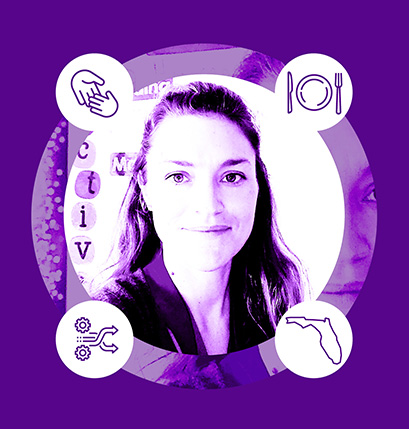For Julie Candia, a 2020 NYU Teacher Residency alum, the decision to become a teacher came after a significant career in the entertainment industry in Los Angeles. “For 10 years, I worked in the entertainment business. It was stressful and fulfilling in many ways.” Then children and a relocation with her husband to Florida, where Julie is from, prompted her to consider new ways to make a difference in her own community.
In 2019, when her youngest son started kindergarten at a Blue Ribbon Title I school in Palm Beach County, Julie found herself volunteering in his classroom and becoming increasingly aware of the teacher shortages in the county. She decided to start exploring how she could become a teacher. No programs seemed quite right until she found the Teacher Residency.
Making an impact in a community
“This was the perfect program for me. I wanted to learn how to be the best teacher I could be from the best professors, while also having a hands-on experience in the classroom. I wanted to work at a Title I school where I could demonstrate best pedagogical practices, taught to me by the leading thinkers and researchers in education, to children who have historically been overlooked and underserved.”
Julie didn’t want to be immersed in just any school. She wanted a place where she could be involved – where she would know the community, could work with children in her own neighborhood, and provide them access to a great education. This was another reason Julie found the Teacher Residency so attractive: she could learn to become a teacher in her own community of Palm Beach.
“What we’ve experienced in recent years, with the growing opportunity gap – especially for people of color – I wanted to do something about that. As an adult, I can reflect on my own education and recognize that I’ve had this white privilege. I’ve had opportunities and access to education that so many people have not had. I wanted to make an impact and do my part.”
A path to special education
Julie drew on a life-changing experience from high school to help her decide what she’d like to teach. Despite a love of history and a degree in economics, Julie decided against social studies and instead chose special education.
While working as a hostess in a local restaurant during the summer between her junior and senior years in high school, Julie’s boss asked if she’d be willing to train a new busboy, Michael.
“Michael was in his early 40s and had an intellectual disability, and he was an incredible person. Michael put extreme care and focus into his work, and his joy was contagious as he mastered tasks. He taught me to see the beauty in the ordinary. Working alongside Michael was a life-changing experience. I learned to treat everyone with respect and that regardless of age or ability, every person has a talent and a gift to give.
“My passion lies in special education. I want to ensure all children get equal access to an education that suits their individual needs, and my hope is to make an impact on each student’s life, just as Michael made an impact on mine.”
The Teacher Residency both reinforced and expanded Julie’s passion and understanding of what students with disabilities need to succeed. “One of the most important lessons that [NYU Steinhardt] faculty reinforced was an asset-based way of thinking, which is so important in special education. We learned to focus on all that students and families have to offer and acknowledge that we each have a lot to learn, too. There’s so much to learn from my students and families.”
A set of tools for continual improvement
The immersive aspect of the Teacher Residency helped Julie apply theory to practice. “The lessons were all so applicable. What we were going through in the classroom was exactly what NYU Steinhardt was covering in its curriculum.”
“I learned to look at each student in a broader and more unique way. We examined how to tailor lessons for individual students’ diverse learning needs.”
Julie discussed how the program gave her an “amazing toolbox to always go back to.” During the 2020-2021 academic year, her first as a full-time teacher, she frequently leverages this toolbox for resources and reminders, especially about building relationships with students and their families.
“It’s so much harder being virtual, but we have to be creative. I try phone calls home and breakout rooms in our remote sessions so I can get to know my students. Relationships are a big part of becoming an effective teacher.”
Julie learned to also appreciate the relationships she formed with her Teacher Residency cohort and the fellow teachers in her school. “I needed that huge network of support. I made friends in the cohort and friends at school, and had incredible mentorship from the professors. This was really a game changer. I left the program knowing people in my district, NYU Steinhardt faculty, and new teachers all over the country.”
The vast access to resources and support, especially as a career changer, made a difference for Julie. “In hindsight, that is one of the big takeaways for me personally: the personal growth that I experienced from all the people that I met. The new perspectives, information, and just caring – there are people here for me if I need help at any point.”
Julie offered some advice and reflection to prospective teachers considering the Teacher Residency: “It’s a difficult program by design. You can do it though. You will learn to rely on your cohort so much. I had a six-year-old and a four-year-old while working full time, figuring out school at night, and still managing their bedtime. The fact that I went back to school at 39 years old and found something that I love to do – it’s a dream.”
